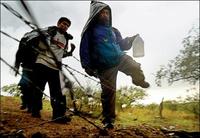-
SAFETY Act falls short
The SAFETY Act (the Support Anti-terrorism by Fostering Effective Technologies Act of 2002) was created in order to speed up the pace of homeland security-related technologies and solutions reaching the market; the act encourages private firms to develop technology to combat terrorism by providing liability protection in case a firm is sued; since applications by companies for Safety Act coverage began in 2004, not many more than 400 technologies have been approved under the act; critics say that number should be in the thousands; they say the act is a good idea — but few in the industry know about it
-
-
QinetiQ's OptaSense to protect India's major oil pipeline

The 670 km Mangala Development Pipeline (MDP) is the world’s longest continuously heated and insulated pipeline; it will have access to 75 percent of India’s refining capacity; the company operating it will install QinetiQ’s OptaSense technology to secure the pipeline; OptaSense system is designed to detect, classify, and locate potential threats to buried pipelines
-
-
FBI leads Lockheed Martin cyberattack investigation

The FBI recently announced that it is leading a federal investigation into a cyberattack on defense giant Lockheed Martin’s networks; the investigation will be led by the National Cyber Investigative Joint Task Force and is aimed at determining if the attack was a result of “poor hygiene, if nothing was infiltrated and nothing taken or something more”; on 21 May, the company detected a “significant and tenacious” attack on its networks that was met with a swift response; the FBI declined to comment on what actions it would take if the investigation revealed that the attacks were perpetrated by state or non-state actors
-
-
SBInet: dismal failure // from Lee Maril, Ph.D.

SBInet was a dismal failure — at a cost of more than $1 billion to the American taxpayer; the public deserves much better than DHS has given us along the Mexican border, including a fair and objective investigation of Boeing’s waste of taxpayer’s money in hard economic times
-
-
Homeland security is big business
According to financial analysts the homeland security business is still growing nearly ten years after the 9/11 terrorist attacks; analysts project that the market for homeland security goods like body scanners, radiation detectors, and surveillance cameras will grow 12 percent each year until 2013; the market for x-ray and body scanners is set to grown steadily at 15 percent annually as airports begin replacing aging equipment and the market expands; analysts say that the primary driver for future growth will be in cargo screening at airports and seaports as only a small percentage of cargo is currently scanned
-
-
Germany struggles to find source of deadly E.Coli outbreak

German health officials struggling to find the source of deadly E.Coli outbreak suffered another setback when Spanish cucumbers were found to have been incorrectly declared the source of the infections; so far seventeen people have died and more than 1,500 Europeans have been sickened by a rare strain of enterohemorrhagic E. Coli (EHEC); eighty new cases were reported in Hamburg between Monday and Tuesday alone and hospitals are treating 110 patients critically ill with hemolytic uremic syndrome (HUS); the current outbreak has disproportionately affected women, and health officials are struggling to understand why; health officials have urged to not purchase any vegetables declared as potentially dangerous
-
-
Heightened border security helps fuel billion dollar smuggling business
As the United States makes it more difficult to cross its borders illegally, business for human traffickers has been booming with smugglers making billions of dollars a year; traffickers make an estimated $6.6 billion each year by bringing immigrants across the U.S.-Mexico border; in May, x-ray machines at checkpoints in southern Mexico found 513 people crammed into two trailers, leading to the largest bust yet; the United States has inadvertently generated a boom in the smuggling business by making the border harder to cross; drug cartels are believed to have entered the lucrative market
-
-
Envisage Technologies to provide Indiana DHS with software
On Wednesday Envisage Technologies announced that it was working with the Indiana Department of Homeland Security (IDHS) to implement the third phase of its state-wide readiness strategy; Envisage will expand its Acadis Readiness Suite, an integrated software tool that automates complex logistical tasks that normally require a host of various databases, software, and systems, to include secure certification of users; state officials say that the added software capabilities will help agencies more accurately assess resource needs and respond more quickly in emergencies
-
-
Study: U.S. immigration policy perpetuates poverty

A new study says that the U.S. current immigration system — that is, the legal immigration system — is dysfunctional in that it is not responsive to the socioeconomic conditions of the United States; the main flaw in the current system — a flaw, the report argues, which will be exacerbated by allowing millions of undocumented immigrants to become citizens — is that only a small share of legally admitted immigrants is sponsored by employers while the bulk are admitted because of family ties to earlier immigrants who may be living in poverty or near poverty
-
-
Data breaches compromise nearly 8 million medical records
The revelation that millions of people have had their personal medical records stolen could slow the Obama administration’s efforts to digitize the nation’s health care records; in the last two years alone nearly eight million people have had their medical records stolen or compromised; 1.7 million patients, staff members, contractors, and suppliers at several New York hospitals had their information stolen when thieves removed them from an unlocked van; to ensure that medical records are safe, HHS has begun imposing penalties on health care providers who compromise their patient’s records; but some health care experts wonder if enforcing HIPAA alone will be enough to address the problem
-
-
DHS completes tests on mind reading technology

DHS officials recently completed an initial round of tests for its new intent detecting technology; with the Future Attribute Screening Technology (FAST) program, DHS hopes to be able to identify terrorists or criminals before they execute an attack; FAST relies on remote sensors to measure several physical indicators like heart rate and how frequently one’s eyes flit back and forth; so far the technology has only been tested in a laboratory setting, but DHS says that it has been able to achieve a 70 percent accuracy rate; in the next battery of tests, officials will examine how FAST fares in more realistic settings; many scientists criticize the program for the dubious science behind it
-
-
New business: guided border tours
The increased attention to the security of the U.S.-Mexico border has caused many Americans to want to see for themselves what is going on along the border; this gave Tucson, Arizona-based Gray Line an idea, and the “Border Crisis: Fact and Fiction” tour is the result; the guided tour takes passengers to various points along the Arizona part of the U.S.-Mexico border; the trips will be offered twice a month, or upon request for large groups; the all day tours, which include lunch, cost $75 per person
-
-
Industry leaders, policy makers to meet at SIA Government Summit
The Security Industry Association (SIA) is gearing up to hold its annual Government Summit conference in Washington, D.C. once again; each year the two day event brings security professionals, business leaders, and policy makers together to discuss the latest federal and state trends as well as the latest legislation and regulations that affect the security industry; the event’s headliners are Bill Kristol and Bill Press; the two will debate one another on a wide range of issues including the impact of the 2010 mid-term elections, the 2012 presidential campaign, as well as policy matters; the conference will be held on 21 June to 22 June at the Phoenix Park Hotel in Washington, D.C
-
-
Global warming: Arctic access by land will diminish, but improve by sea

Global warming over the next forty years will cut through Arctic transportation networks like a double-edged sword, limiting access in certain areas and vastly increasing it in others in absolute terms; winners are expected to be coastal communities, coastal resource-extraction operations, tourism, fishing, and shipping concerns; potential losers include inland mining and timber operations, inland oil and gas drilling, and smaller inland communities, often inhabited by indigenous peoples; Canada and Russia stand to lose the most winter-road potential as rising temperatures will prevent up to 400,000 square miles from hardening into potential roadways
-
-
Northrop wins $141 million follow-on contract for DOD biometric system
Today, defense giant Northrop Grumman announced that it was awarded a $141 million follow-on task order to continue working with the Department of Defense (DOD) on its biometric identification system for military threats; under the contract, Northrop will continue work on the DOD’s Automated Biometric Identification System (ABIS), which functions as the centralized database that collects facial, fingerprint, iris, and palm biometric records on individuals that the Department of Defense has identified as persons of interest
-
- All
- Regional
- Water
- Biometrics
- Borders/Immig
- Business
- Cybersecurity
- Detection
- Disasters
- Government
- Infrastructure
- International
- Public health
- Public Safety
- Communication interoperabillity
- Emergency services
- Emergency medical services
- Fire
- First response
- IEDs
- Law Enforcement
- Law Enforcement Technology
- Military technology
- Nonlethal weapons
- Nuclear weapons
- Personal protection equipment
- Police
- Notification /alert systems
- Situational awareness
- Weapons systems
- Sci-Tech
- Sector Reports
- Surveillance
- Transportation
Advertising & Marketing: advertise@newswirepubs.com
Editorial: editor@newswirepubs.com
General: info@newswirepubs.com
2010-2011 © News Wire Publications, LLC News Wire Publications, LLC
220 Old Country Road | Suite 200 | Mineola | New York | 11501
Permissions and Policies
Editorial: editor@newswirepubs.com
General: info@newswirepubs.com
2010-2011 © News Wire Publications, LLC News Wire Publications, LLC
220 Old Country Road | Suite 200 | Mineola | New York | 11501
Permissions and Policies
